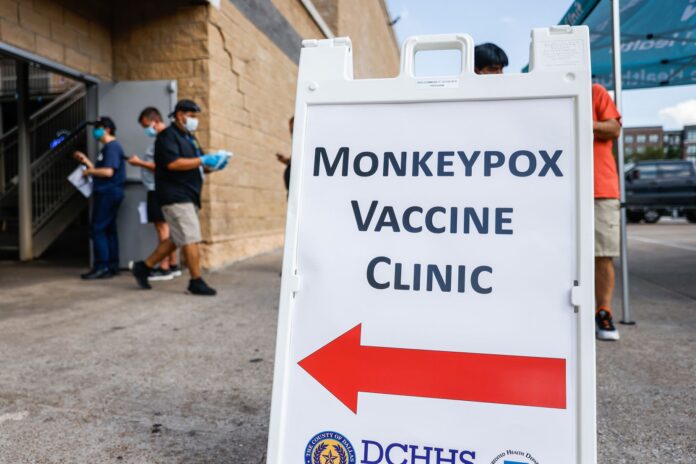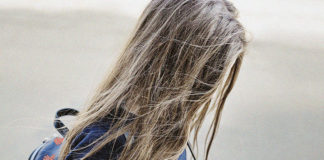The annual T-shirt swap is a staple of the Gay Softball World Series. Participants from more than 250 teams trade tees as souvenirs representing their cities from around the country.
But this year, organizers in Dallas discouraged players from swapping shirts at the event’s opening ceremony in an effort to prevent the spread of monkeypox. It’s yet another celebratory moment tainted by the smallpox-like virus, which can be transmitted through skin-to-skin contact, prolonged intimate contact and contact with contaminated materials, like clothing or bedding.
“It’s a longstanding tradition, but we made the recommendation to suspend it. We don’t want the virus to spread that way,” said Ryan Holdhusen, executive director of the local host organizing committee.
This summer was supposed to represent a return to normal after two years of COVID-19-related lockdowns. For many North Texans, especially those in the LGBT community, the monkeypox virus threatens to change that.
Monkeypox has circulated rapidly in the last three months. At least 816 monkeypox cases have been reported in Dallas, Tarrant, Collin and Denton counties. Dallas County accounts for the large majority of infections in the region, with at least 616 confirmed cases as of Sept. 9.
While there is a monkeypox vaccine, it’s in short supply. Health departments have limited who qualifies for the two-shot regimen as they await dose allotments from the federal government.
Local government officials have urged people to rethink communal gatherings where close contact is likely. Men who have sex with men were cautioned in particular, as this monkeypox outbreak has been spreading primarily among that demographic.
Dallas County Judge Clay Jenkins issued an emergency declaration over the outbreak last month in an effort to source more vaccines, but stopped short of requiring the closure of businesses.
“We’re trusting businesses that are open every day like clubs where people dance to be responsible,” Jenkins said when announcing the emergency declaration. “You can still go dance, just make sure to have your shirt on and limit skin-to-skin contact.”
LGBT business owners and event organizers have had to balance the importance of people coming together with the risk of viral outbreaks.
The owners of Dallas’ Station 4 postponed a circuit party at the gay dance club in early August, citing the spread of monkeypox and the lack of vaccine access, the Dallas Voice reported.
Celebratory parties at the Gay Softball World Series continued last week, but participants were encouraged to dance with their shirts on and to be mindful of potential exposure to the virus, Holdhusen said.
Meanwhile, business hasn’t slowed at Alexandre’s, bar owner Lee Daugherty said, although monkeypox is a frequent topic of conversation.
“People are talking about it a lot,” he said. “But some of the behaviors that transmit this are not done in bars, so it’s less of a worry here.”
Monkeypox is not considered a traditional sexually transmitted disease, but it can be spread during close, intimate contact like sex or kissing.
The outbreak is a difficult situation to navigate, especially given the uncertain nature of the ever-present COVID-19 pandemic, said Rafael McDonnell, advocacy and communications manager at the Resource Center in Dallas.
“We’re all trying to negotiate how things are as COVID sort of winds down. But now you have monkeypox,” McDonnell said. “I think there might even be a bit of fatigue about all of this. We’ve certainly seen that in terms of general attitudes regarding COVID in the overall population.”
There’s also the additional stress created by increasing political attention given to LGBT issues like gender-affirming health care for transgender adolescents and gay marriage. Just this Wednesday, a federal judge ruled that private health insurance plans don’t need to cover HIV prevention medication if it goes against an employer’s religious beliefs.
Major festivals and parades that often serve as a respite for LGBT people are finally returning after multiyear hiatuses, and attendees are hesitant to let monkeypox stand in their way.
Southern Decadence, a New Orleans festival coined as “Gay Mardi Gras,” welcomed hundreds of thousands of people over Labor Day Weekend. Instead of heeding to monkeypox, event organizers took a preventive approach, setting up pop-up vaccination sites with 6,000 additional doses provided by the Biden administration.
/cloudfront-us-east-1.images.arcpublishing.com/dmn/52JKNYRXPFHTZI5HJQ22HA4D4I.jpg)
Similarly, organizers in Georgia and California held vaccination clinics ahead of Atlanta Black Pride, which took place from Sept. 2 to Sept. 4, and Oakland Pride and Pridefest on Sept. 4 and Sept. 11. The White House announced it was deploying up to 5,500 doses to the Atlanta area and 2,400 doses to Oakland.
The Gay Softball World Series didn’t have vaccine pop-ups, but it did implement education strategies to protect participating athletes. Batters were encouraged to wear gloves when sharing equipment and people were regularly reminded of how the virus spreads.
In some ways, the LGBT community’s experience with both COVID-19 and the HIV/AIDS pandemic better prepared business owners and event planners to continue life as normally as possible in the face of public health concerns.
“The country has learned a lot about contagious diseases in the last two years, and even before,” Daugherty said. “This is a community that takes health very seriously, and that’s especially true with this virus.”








